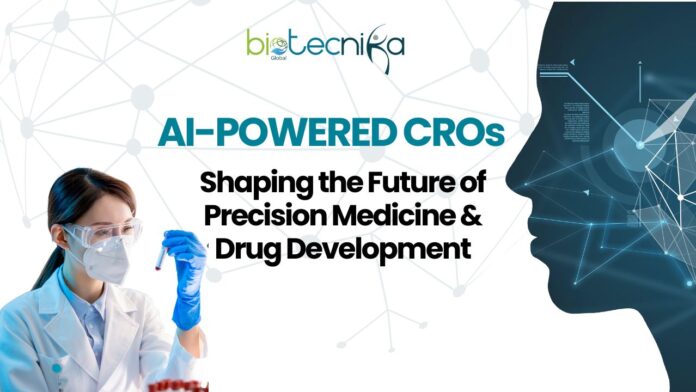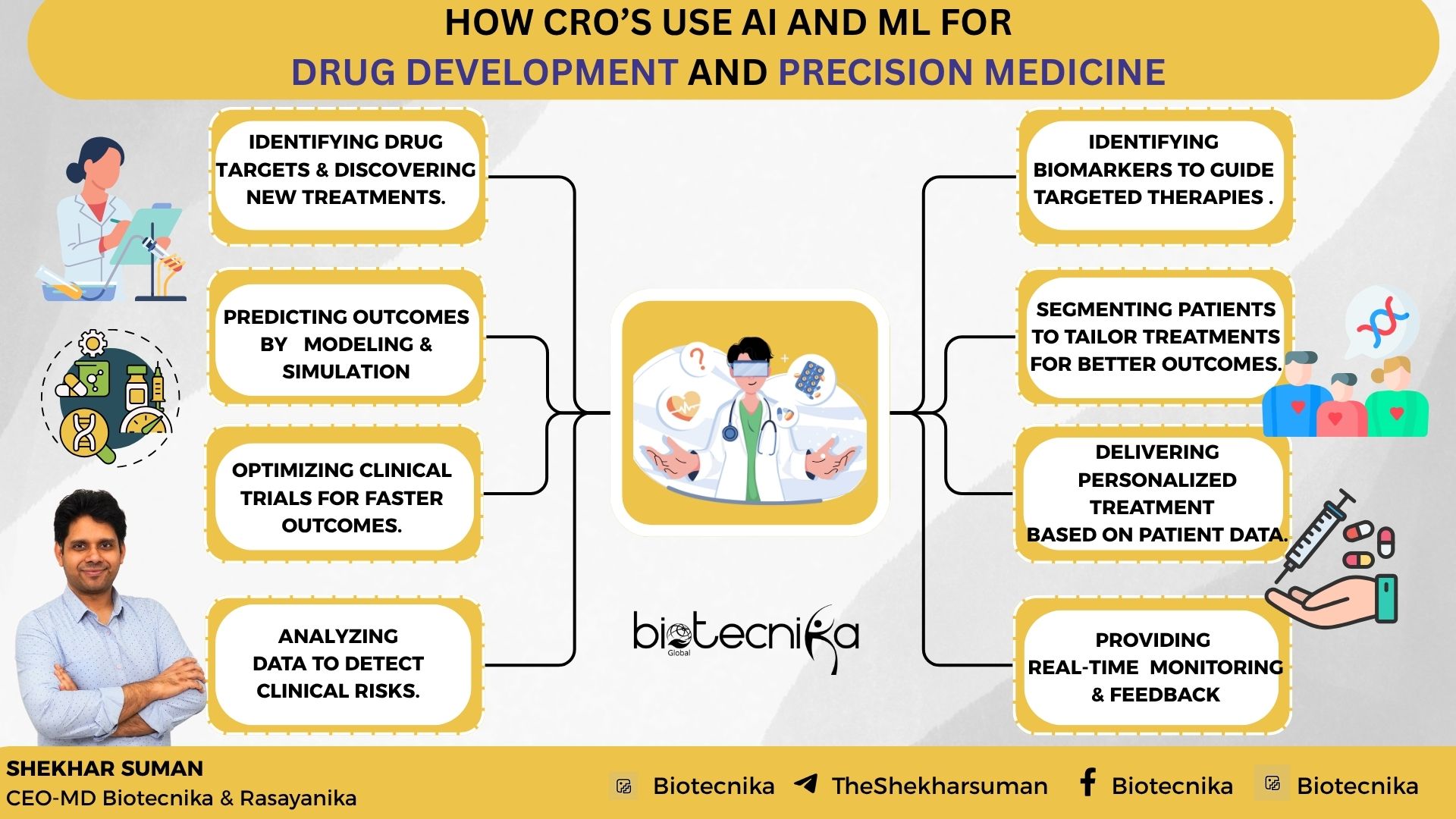How CROs Use AI and ML For Drug Development and Precision Medicine
Imagine a world where Artificial intelligence will take over the drug discovery world, too. CRO in the medical field and drug development will soon leverage AI-driven powers like AI in precision medicine to research, predict diseases, and even make personalized medicines.
A medical breakthrough no longer needs to wait for time-consuming, long-duration drug development processes or clinical trial pathways. These AI platforms will already have genetic data and biomarkers of diseases, which will help to deliver treatment more precisely and quickly.
According to Reuters, on 6 October 2025, AstraZeneca got a license to develop gene therapies for immune disorders with Algen Biotechnologies worth 555 million dollars. This is a US-based company that uses AI in drug development, powered platforms, and CRISPR technologies in research and drug discoveries.
In this article, we will discuss the role of a Contract Research Organization (CRO) in modern drug development and how Artificial Intelligence (AI) is used in drug discovery.
The Role of CROs in Modern Drug Development
Contract Research Organizations (CRO’s) are specialized platforms that partner with pharmaceutical and biotechnology companies to support research, clinical trials, data analytics, and regulatory compliance. In today’s large, complex data and time-sensitive drug environment, CROs are no longer just execution partners, but also innovation hubs.
To meet the increasing demand for AI in precision medicine, CRO’s are taking the help of Artificial Intelligence (AI) and Machine Learning (ML) to manage complex datasets, accelerate timelines, reduce costs, and deliver better health outcomes.
Al in Precision Medicine and in Drug Discovery: Why it Matters
The traditional drug development processes are expensive, time-consuming, and prone to failure. Estimates suggest it costs over $2.6 billion to bring a new drug to market and often takes more than a decade.
By incorporating AI and ML into drug discovery and medicine, researchers are finding effective solutions to these issues.
- Identifying drug targets faster.
- Reducing the need for unnecessary experiments.
- Predicting adverse effects events before they occur.
- Designing treatment approaches for individual patients.
CROs that adopt AI and ML are helping sponsors achieve workflows like never before.
Applications of AI and ML in CRO Drug Development
Target Identification and Validation
AI algorithms can scan large genomic, proteomic, and chemical datasets to discover new drug targets. ML helps in validating those targets that are based on predictive modeling and real-world data correlations. This allows the CROs to discover the early phase findings faster and to collaborate better with biotech companies that are developing new drugs. CRO in the medical field and drug discovery helps CRO’s to refine the early stages of R&D by cutting costs and saving time.
Predictive Toxicology and Drug Screening
Instead of physically testing thousands of chemical compounds in a lab, ML models are used to simulate how the drugs might behave inside the body using computer algorithms. This includes predicting toxicity, side effects, and biological interactions using existing datasets. It not only protects patients but also prioritizes safer candidates for trials. CRO’s use these tools to reduce candidate loss and avoid late-stage failures.
Optimizing Clinical Trials
CRO’s manage thousands of global clinical trials annually. AI is a game-changer in:
- Patient recruitment- Scans Electronic Health Records (EHRs) and registers to identify eligible participants.
- Protocol design- Simulating trial designs to select the most effective, efficient, and safe strategy.
- Trial monitoring- Using the data that is being collected in real time, researchers analyze and make adjustments to improve outcomes or efficiency.
Through AL ML in drug discovery and medicine, CROs are now making trials faster, smarter, and more inclusive.
Data Management and Real-World Evidence
CROs handle enormous amounts of structured and unstructured data. AI automates cleaning, integration, and interpretation, including:
- Natural Language Processing (NLP) for clinical notes.
- Automatically analysing and interpreting images.
- Predicting the outcome using historical and real-time data.
With AI and ML in drug discovery and medicine, these insights not only support regulatory decisions but also lead to better patient outcomes.
AI and ML in Precision Medicine
AI in Precision medicine focuses on designing treatment for an individual’s unique genetic and clinical profile. CROs are at the center of this transformation, using AI to deliver targeted solutions.
Biomarker Discovery and Validation
ML algorithms detect patterns in omics data (genomics, proteomics, metabolomics) to identify biomarkers that predict drug response. This helps CROs and pharma partners to:
- Identify the most promising compounds that are safe, effective, and suitable for further clinical testing.
- Categorize groups of patients who share similar characteristics such as genetics, disease stage, or treatment stage.
- Design treatments that are personalized to individual patient needs rather than using the same approach for everyone.
Again, CRO in the medical field and drug discovery play an important role in enabling such precision.
Patient Subgroup Classification
Using ML, CROs can group patients based on biomarkers, lifestyle data, and environmental factors. This leads to more accurate diagnoses and better-designed treatments.AI ensures that trials include the right participants, not just any random individuals, thereby improving both safety and efficacy.
Personalized Treatment Protocols
With AI platforms, CROs can simulate how different patient profiles will respond to specific treatments. These systems can recommend drug combinations, dosages, and timelines based on personal health data. This is also an example of how CRO in the medical field and drug discovery is helping shift healthcare from treating illness to preventing it.
Real-Time Monitoring and Feedback
AI integrates data from wearables, sensors, and mobile apps to monitor patients in real-time. This lets CROs to detect adverse events early, adjust dosages, and provide continuous support throughout the trial or treatment phase.
It is not only about delivering precise treatments, but also about preventing diseases before they occur.
CROs at the Forefront of AI-Driven Drug Development
IQVIA:
IQVIA stands at the forefront of AI-driven clinical research, utilizing advanced machine learning platforms to optimize every phase of the clinical trial process. Their integrated systems analyse vast datasets, from Electronic Health Records (EHRs) to genomic profiles, to accelerate patient recruitment, identify ideal trial sites, and predict potential risks.
Parexel:
Parexel is using the power of AI and wearable technology to make clinical trials more patient-friendly and efficient, especially in remote and in-person trial models. By integrating data from smartwatches, sensors, and other wearable devices, Parexel can continuously monitor patients’ health in real-time without requiring them to visit a clinic frequently. AI tools analyze this data to detect patterns and track treatment effects, and even predict potential health issues before they become serious.
Labcorop Drug Development (Covance)
Labcorp Drug Development utilizes advanced predictive analytics to make clinical trials smarter and more efficient. By analyzing large amounts of data, patient information, and the performance of different research sites, they can plan where and how the new trial should be conducted. Their data-driven approach also helps in designing the trial and making sure everything runs smoothly and meets regulatory expectations.
The Future of AI Revolution in Drug Development
The clinical research field is approaching a major period of transformation, with AI expected to lead the future. Here is what we can expect.
- AI-Generated Protocols: Improving study design with faster and more accurate results.
- Digital Twins of Patients: Researchers will be able to run vital trials and forecast treatment effects before involving human subjects.
- Federated Learning Models: Enable AI to learn from patients’ data spread across different sites, enhancing analysis while keeping data private.
- Real-time AI-assisted Regulatory Submissions: will accelerate approvals by automatically generating and validating documentation in line with regulatory standards. Together, these advancements will make drug development faster, smarter, and more patient-centric.
For CROs, these are not just futuristic ambitions; they are becoming operational necessities. Those who master CRO in the medical field and drug discovery will shape the future of healthcare innovation. AI and ML are redefining what CROs can do, from discovering new molecules to personalizing therapies for individual patients. The application of CRO in the medical field and drug development processes is not just accelerating R&D; it is also delivering safer, smarter, and more effective healthcare solutions. CROs that adopt this digital shift are no longer just supporting clinical trials; they are co-piloting the future of AI in precision medicine.







